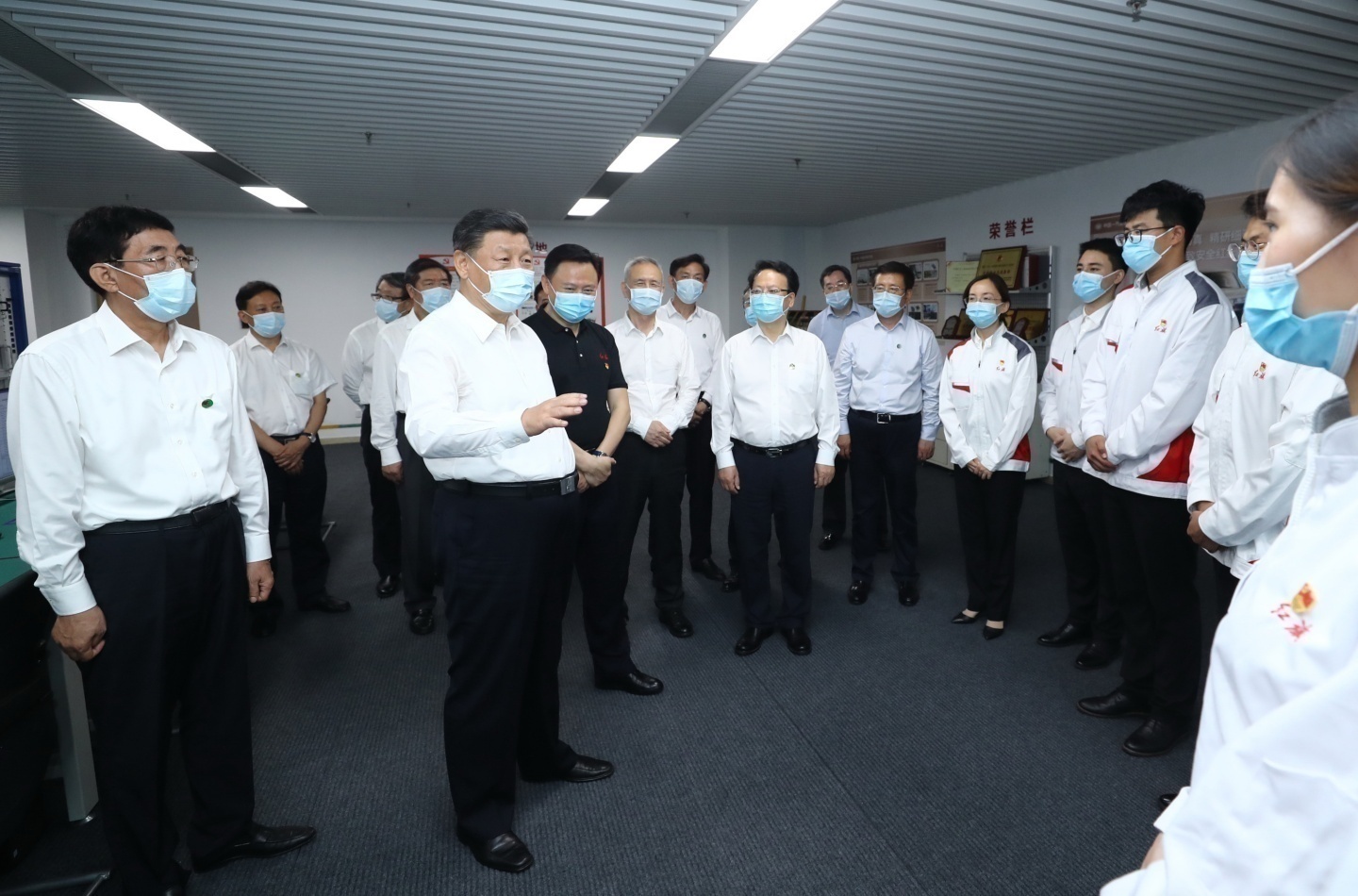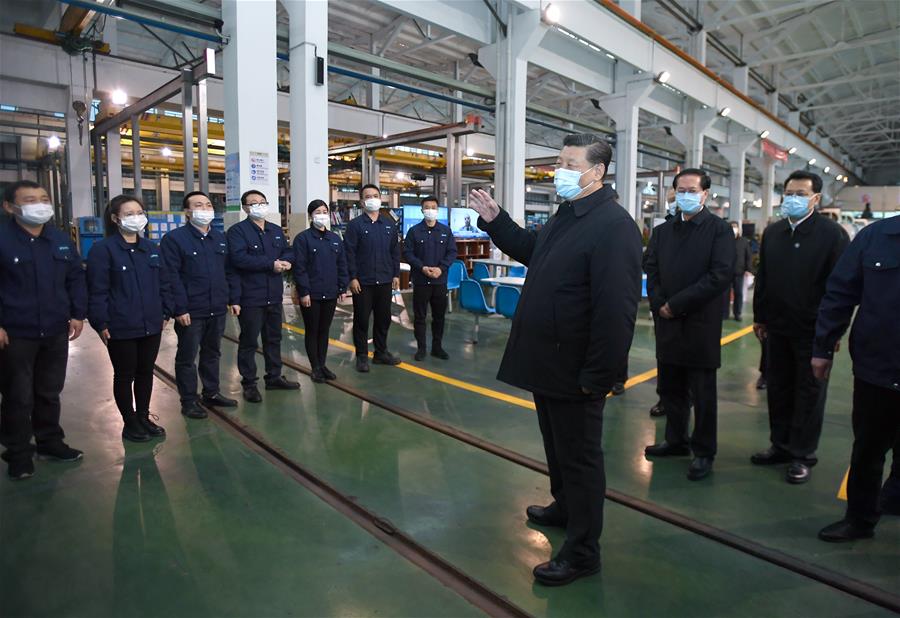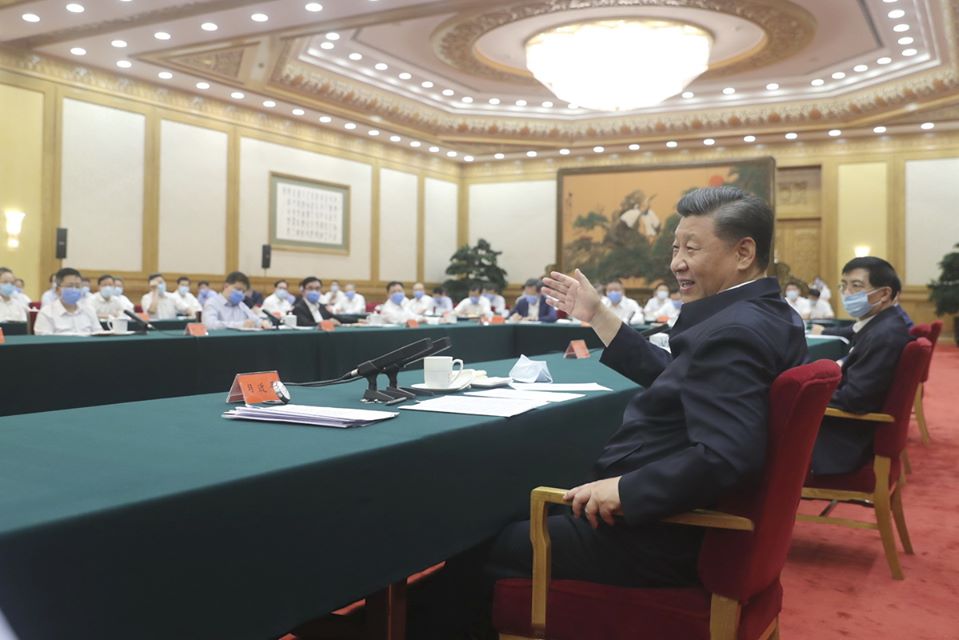With COVID-19 epidemic hitting the global job market hard, Chinese President Xi Jinping has issued many instructions and attached great importance to employment.

Xi learns about the reform and development of state-owned enterprises at the R&D headquarters of automaker FAW Group in Changchun, Northeast China's Jilin Province, July 23, 2020. (Photos: Xinhua)
College graduates, migrant workers
Mass layoffs should be avoided and close attention must be paid to employment, Xi said as he inspected epidemic prevention and control work in Beijing in February.
Xi urged a particular focus on college graduates and rural migrant workers.
On July 23, Xi visited the R&D headquarters of Chinese automaker FAW Group during his inspection tour of Changchun, the capital city of Northeast China's Jilin Province. He chatted with new graduates about their work and income at FAW.
Xi noted that the COVID-19 epidemic was creating job difficulties this year for college graduates and migrant workers, but that the CPC and governments at all levels were trying to help generate jobs.
Graduates were encouraged to adjust their employment expectations, carve out a space and dedicate themselves to their work in their quest to realize their dreams.
Xi has also focused on migrant workers and emphasized that migrant workers in low-risk areas should be encouraged to return to work with "point-to-point" transportation.
On May 22, Xi joined deliberations of the Inner Mongolia delegation at the third session of the 13th National People's Congress in Beijing where Xue Zhiguo, a delegate from the city of Chifeng, reported efforts to help rural migrant workers find employment.
Xue said that after the epidemic, many migrant workers stayed at home without income and when restrictions eased, the government coordinated with employers to help them resume work safely and quickly.
"Did they all come back?" asked Xi.
"Ninety percent have resumed work in Beijing,” Xue said.
"What can they do if they work at their hometown?" Xi said.
They could join agricultural cooperatives, Xue said, as millet and buckwheat grow well in Chifeng.
In the first half of this year, “point-to-point” transportation empowered 6 million migrant workers to return to work.
Through efforts by all parties, 28.3 million impoverished migrant workers left their hometowns for work by the end of June, a larger total than the previous year.
Burdens, positions & jobs
Xi stressed stabilizing employment, ensuring the basic necessities of the poor and helping smaller enterprises tide over difficulties.

Xi visits an industrial park, which produces high-end auto parts and molds, in Ningbo, East China's Zhejiang Province, March 29, 2020.
In February in a speech at a meeting in Beijing about coordinating the prevention and control of COVID-19 and economic and social development, Xi required solid implementation of employment policies with flexible adjustments and the roll-out of comprehensive measures to cut corporate burdens, stabilize the payroll and create more jobs.
During an inspection tour of East China's Zhejiang Province on March 29, Xi noted that normal operations at businesses would ensure a healthy economy, create jobs and deliver incomes for people.
On June 8, Xi listened to villagers of Hongde in Northwest China's Ningxia Hui Autonomous Region relate their work experiences. More than 100 work at a carton packaging enterprise.
Xi spoke highly of their efforts and noted that working in one’s hometown has benefits including more time to care for the family and accommodation, transport and other miscellaneous savings.
On July 21 Xi chaired a symposium with entrepreneurs in Beijing where he urged them to take up their social responsibility, strive to stabilize their payrolls and provide more support for their employees to tide over difficulties together.
Flexible employment
On February 23, Xi stressed supporting flexible employment through multiple channels and helping self-employed businesses resume operations.

Xi chairs a symposium with entrepreneurs in Beijing, capital of China, July 21, 2020.
China has more than 82 million small self-employed businesses which create more than 200 million jobs.
They are the largest category of market entities in the country that are directly related to people's lives. They also face the most difficulties.
Great attention should be paid to the development of individually owned businesses, Xi said on July 21 at a symposium with entrepreneurs in Beijing, urging more direct and effective policy support to help them overcome rent, fees, taxes, social insurance and financing difficulties.
Catering, transport and accommodation have been hit hard by the epidemic.
Online retailing, video conferencing and telecommuting have created flexible job positions, Xi noted.
On May 23, at a joint panel discussion of national political advisors from the economic sector, advisor Wang Yiming said opportunities often hide in difficulties.
“New forms of employment" could provide more jobs and earning opportunities for people affected by COVID-19, Wang noted.
Wang said his research indicated "new forms of employment" could be a "reservoir" of employment and "stabilizer" of people's lives.
From January 20 to March 30, 457,800 people registered at Meituan Dianping, a leading food delivery platform in China, to become delivery drivers, Wang said.
A total of 257,000 delivery drivers were among the impoverished population. More than half of the drivers of online car-hailing company Didi were migrant workers, Wang said.
The rise of "new forms of employment" was sudden, like COVID-19, Xi noted, and deserved support.
Xi called for timely rules and policies in support of "new forms of employment" to protect the rights of relevant workers and consumers.
(Translated by Ma Wenqian, Original story from People's Daily app)


